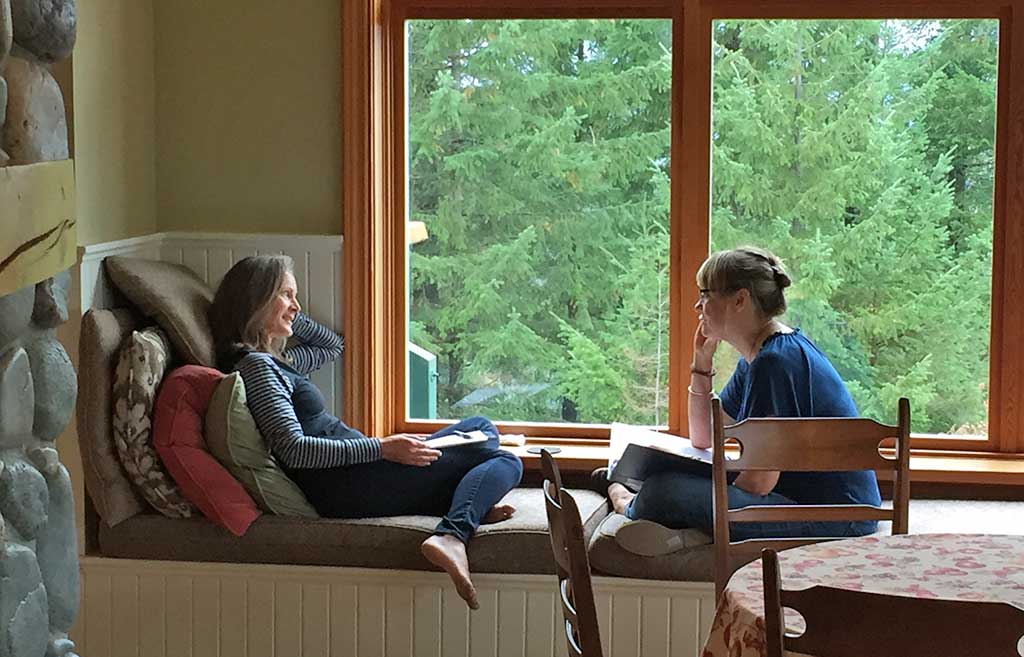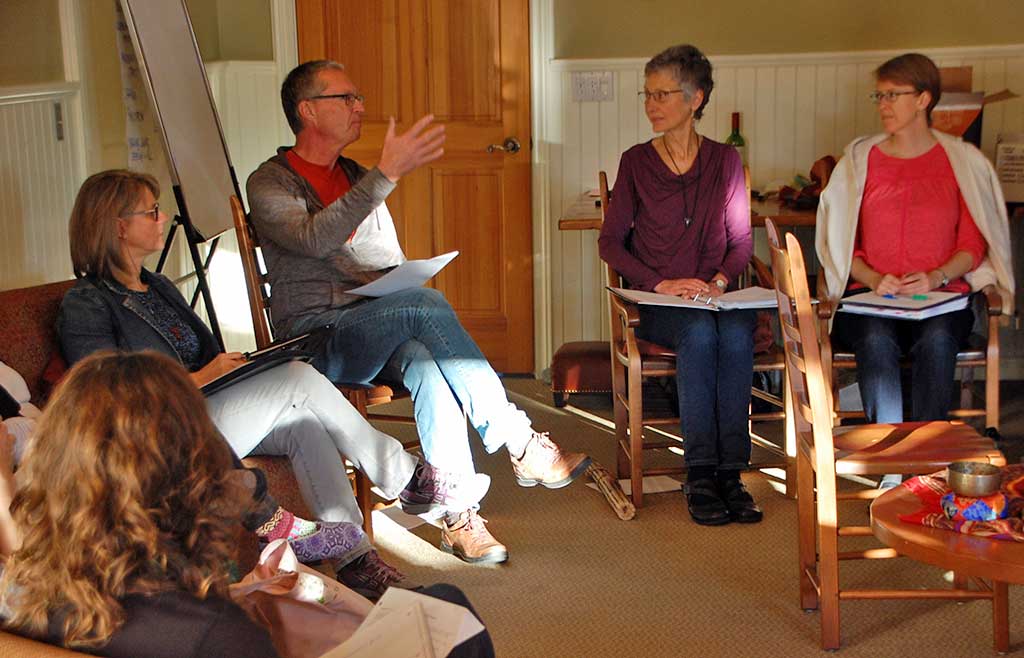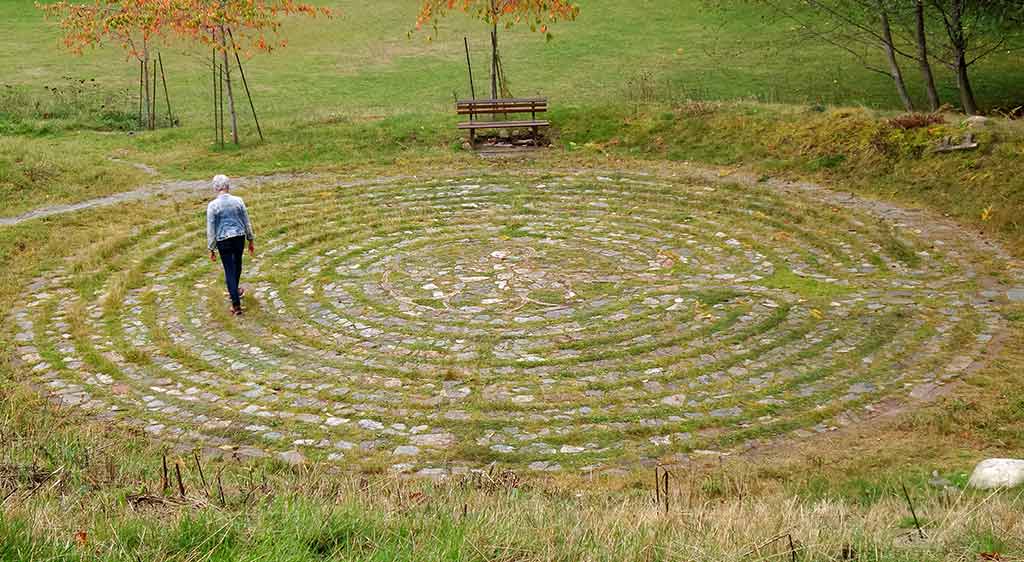Frequently Asked Questions
We’ve compiled several questions below that many people ask before applying to the Art of Spiritual Direction program. If you have additional questions, please contact us.
SoulStream describes spiritual direction as: “The simple gift of sacred Presence offered to another providing a gentle but tenacious encouragement to open fully to God’s loving Presence and to co-discern with that person God’s activity in every aspect of life.” We do not consider advice giving, fixing, rescuing or even “directing” as true spiritual direction. For a more complete description of SoulStream’s understanding of spiritual direction, please reference this helpful article by Jeff Imbach on our website.
Weekly rhythm
The first 3 intensives are 6 days long, beginning with a gentle and spacious Friday evening check-in and ending with Thursday afternoon Eucharist and a closing. The 4th day in each intensive is a silent, Sabbath rest day. The final intensive is a long weekend beginning with a check-in Thursday evening and ending with a graduation ceremony to which some family and friends can be invited.
Daily rhythm
A typical daily schedule may look like this:
- 7:30 am morning prayer
- 8:00 am breakfast
- 9:00 am – 12:30 pm coursework (including a break)
- 12:30 pm lunch
- 1:00 – 3:45 pm personal time
- 3:45 – 4:45 pm mini spiritual direction sessions
- 5:15 pm dinner
- 6:30 – 8:30 pm coursework
- 8:45 pm evening prayer
The most important expectation we have is for participants to enter in open-heartedly and vulnerably. Other expectations would include being faithful in receiving ongoing spiritual direction, attendance at all intensives, engagement with 2 volunteer directees at the start of the program increasing to 4 after the second intensive, completion of all assignments in a timely manner, minimal use of electronics during the intensives and for you not to take yourself too seriously!

We look for a reflective, vulnerable approach, integrating your life experience in your journals and book reflection papers. Two supervisor reports are offered and discussed during the course: the first after several months of meeting with your supervisor and the second at the end of the course.
Receiving spiritual direction is part of our own ongoing journey in listening to ourselves and to God. We cannot offer what we have not received.
Many participants come into the course not knowing clearly if they will be spiritual directors. For all participants the course is a process of discernment, a way of strengthening their own spiritual lives and a means of becoming a compassionate listening presence to others. Is there something drawing you to explore this course? Consider this as the initial work of the Spirit and trust that your discernment will become clear. And for some, your community might already be affirming your interest in offering spiritual direction.
Yes, this is an important part of your learning. Suitable directees are those who desire to explore their spiritual longings or know God more deeply, who are able to approach you and sessions with honesty and who are able to meet with you monthly. We will provide you with some suggestions and resources to help you in this pursuit.
This course is costly in terms of your time! Between each intensive, you will do the following:
- write a 1-page monthly journal for submission to your supervisor
- reflectively read 2 books from the bibliography and write a 3-page personal reflection on each reading
- meet with your volunteer directees monthly for spiritual direction and journal after each of these spiritual direction sessions. You will meet with 2 volunteer directees between the first and second intensive, and 4 volunteer directees for the remainder of the course
- prepare the documents for supervision, meet with your supervisor regularly (11 times in total throughout the course), and journal following each supervision session
- have 2 collaborative conversations with supervisors around supervision reports
- have conversations between intensives with class partners
- meet with your own spiritual director monthly
It is difficult to quantify the amount of time this will take since each individual is different in the time needed for reflection, reading and writing, and preparing for supervision.
There is no universally received certification board for spiritual directors. The reason for this is certification emphasizes skill development. Although skill development is important, there is far more to being a spiritual director than objective quantifiable standards. How does one measure a heart open to God, inner transformation, listening to our lives, growing in sensitivity to our call, offering sacred space? Although these cannot be measured, they are foundational to offering spiritual direction with integrity. Our commitment is that you will finish the program with a strong foundation to offer spiritual direction.
Read about our Program Distinctives.
Participants consistently comment about the relationship the facilitators share and the quality of the facilitation. A few comments:
“I loved the teaching and I thought the different personalities and gifts of facilitators, and the way you worked together, as well as the variety of types of teaching made for a rich mix.”
“The facilitators set a tone of grace and kindness, and offered a patient pace that was most helpful.”
“The facilitators modeled vulnerability and honesty, expressing spiritual life as lively and ongoing, and without a sense of hierarchy or having arrived.”

Read about our Program Distinctives.
Please visit Program Application page for the program fees and payment schedule.
Please visit Program Application page.
Options for fitting this into your life financially can be discussed with the SoulStream Administrator, including payment schedules through automatic deposit which will fit your budget. We do not want finances to be the deciding factor in your application. Previous applicants have approached their church or religious community for financial assistance.
We hold confidentiality in high regard. This includes all that is shared in the intensives as well as what is shared with us by our directees in the spiritual direction sessions that we offer. We expect the same respect for confidentiality from our participants. We embrace the confidentiality guidelines articulated by Spiritual Directors International, page 2.
We are firm about applicants receiving regular spiritual direction for at least a year prior to the start of the program. And because this course is rooted in contemplative spirituality, we want to know that participants are personally engaged with and committed to contemplative life experience. We know that applicants who have come through Living from the Heart will have been exposed to and encouraged to live into what we hold as foundational understanding and practice. However, we do recognize that some people interested in our program will come from different experiences of spiritual formation. To that end, we do consider alternate points of entry in lieu of Living from the Heart as long as the interested person is able to provide information to assure the facilitators there has been significant movement toward an integrated contemplative life experience. For additional information, please see Process for review of alternate experience to Living from the Heart for approval to apply to Art of Spiritual Direction.
You are welcome to use this link to SoulStream’s website for spiritual directors available in your area. Or you can contact our SoulStream administrator who will suggest possible spiritual directors in your area. Please feel free to contact our administrator at: soulstream1@gmail.com.
The course costs cover tuition, supervision, accommodation and food for the intensives. Not covered are travel to each intensive, personal spiritual direction and purchase of books.
The best reference is, of course, someone who knows you well – perhaps a pastor, work colleague, or a close friend or confidant. We ask you to avoid immediate family members. We do want one of your two references to be your current spiritual director.
An experienced supervisor will be assigned to you at the end of the first intensive. You will make a switch to a second supervisor part way through the course and experience the gift of another voice. You may meet with your supervisor in-person, by phone or on-line. Eleven supervision sessions are included in your tuition. If you wish to have additional supervision sessions beyond what the course offers, we ask that you pay this supervisor directly for the additional sessions.
Having a Sabbath day IS part of your learning as a spiritual director! You will discover great benefit for you to experience the rest, renewal and restoration a Sabbath offers. It is a time to reorient yourself to who you are and help you make space to listen to what is most nourishing or true, all held within the gentle stillness of God. You will find your learning on the other days enhanced because of this day. Participants consistently mention how grateful they are for this day and the timing of it within the intensive.

When we choose a venue for the course we are looking for a place that is hospitable and accommodating to our needs, with the room we require and with reasonable access to additional facilitators. Availability of such a place varies from cohort to cohort. We have discovered location has minimal impact on who applies to the course as all of our participants travel to the intensives, some from a great distance.
It is our desire that all the decisions with regard to participation in the ASD program will be made by June 30th. You will receive notification of acceptance into the program via email from the coordinators by June 30th. Anyone who has applied but not been accepted will also be notified by June 30th.
